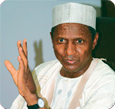The Presidency has stopped the privatisation or concessioning of its 102 colleges, otherwise known as unity schools.
The Minister of Education, Dr. Igwe Aja -Nwachukwu, who made this known on Tuesday at an interactive session with the House Committee on Education in Abuja, explained that government based the decision on two grounds.
He said, The philosophy for the establishment of the Federal Colleges is still relevant. And that philosophy is national integration and unity.
First they toyed with the word, privatisation, adoption and concessioning. We all know that privatisation simply means outright transfer or sale of the schools to private stakeholders.
Concessioning is transfer of management of the schools to individuals and that is a hybrid of privatisation. They were only playing with semantics. We have, therefore, stood down the issue of privatisation or concessioning.We have stopped those policies.”
Nwachukwu said that many policy reversals had taken place in the Ministry of Education since the Umaru YarAdua administration began on May 29.
He said that the ministry sought and got a presidential approval for the reversal of some policies taken by the former Minister of Education, Dr. Oby Ezekwesili.
He said that the merger of tertiary institutions such as universities, polytechnics and colleges of education by the Olusegun Obasanjo administration was being reviewed because of the avalanche of petitions that came in its wake.
Justifying the reversal of the sale of the schools, he said that it was unthinkable for the government to continue to fund them when they would have been operated by individuals or organisations that would not make financial contributions to them.
He said that it was because of this that the ministry was planning an expanded all stakeholders meeting to find the best way of approaching the issue.
The minister added that the junior and senior arms of the unity schools would from 2008 operate from different locations with different sets of management.
He said, We have not placed anybody (pupils) in junior secondary school yet. By December, we shall be asking the National Commission for Colleges of Education to conduct examinations into junior secondary schools.”
Aja-Nwachukwu also hinted that the ministry would soon have an inspectorate division with full powers to close down schools where necessary.
He pleaded with the House to redefine capital expenditure in the budget so that the ministry could spend some money on human capital development.
The Chairman of the House Committee on Education, Alhaji Farouk Lawan, noted that the ministry had reversed almost everything that was done by Ezekwesili.
He advised Aja-Nwachukwu to hold the stakeholders meeting on some of the critical issues on education so that the outcome would be taken care of in the 2008 budget.
Reacting to the new development, the President of the Senior Staff Association of Nigerian Polytechnics, Alhaji Ganiyu Akinleye, parents and stakeholders in the education sector expressed divergent views.
The Association of Senior Civil Servants of Nigeria through one of its officials who pleaded anonymity expressed happiness at the development.
He said, My Secretary-General is not here now, so I cannot speak officially on the behalf of the union but I can tell you the mood of our members. We are very happy at the development.
It is a victory over authoritarianism. If they had been successful, thousands of our members would have been sacked.
All the arguments that we raised against the former minister were genuine and I can tell you we are happy that this new administration has once again proved that it is a listening one.”
Though Akinleye supported the cancellation of the sale of the schools, he called on the government to work hard at removing corruption in the sub-sector.
Also, the Sub-Dean, Faculty of Education of the University of Ibadan, Dr. Kehinde Kester, shared Akinleyes views.
But he advised the government not to throw the baby away with the bath water.
He said, Look, the policy in itself is not totally bad. Or are we saying that there is no corruption in the admission and administration of these public schools? Government should look at this area critically, plug all leakages and ensure an effective supervisory unit.”
The privatisation of the unity schools had met strong resistance from stakeholders.
Ezekwesili had against opposition led by the ASCSN insisted that the introduction of the private/public management model of administration remained the best method of revamping the unity schools.
The schools, she said, needed help because of the rot, corruption and high failure rate of the pupils of the unity schools in spite of huge budgetary allocation to them.
According to her, the increasing failure rate of pupils of the schools in examinations such as the West African Examination Council, had rubbished the huge budgetary allocation being made to the schools yearly.
According to the statistics supplied by the former minister, the Federal Government spent N64.7b to fund recurrent and capital expenditure in the 102 unity schools between 1999 and 2006.
This, Ezekwesili had argued, was between 70 and 80 per cent of the allocation made to the Federal Ministry of Education during the period under review.
In spite of this, she had told Nigerians that only seven of the 65 reporting schools made 50 per cent pass in WAEC while only 15 per cent of unity school pupils passed English and Mathematics in WAEC examinations.
Ezekwesili at the height of opposition to the policy which led to a nationwide strike by teachers and members of the ASCSN after the inauguration of the implementation committee of the policy on November 9, 2006 insisted that schools glory could only be cleared when the private sector and old students associations were involved in the running of these schools.
However, the ASCSN, which led the protest against the privatisation” of the schools through its Secretary General, Mr. Solomon Onaghion, insisted that the policy was anti-people.
By Chiawo Nwankwo, Victor Sam and Segun Olugbile
The Punch
Wednesday, November 21, 2007



